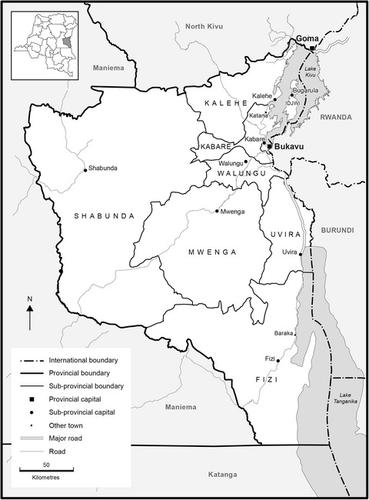当前位置:
X-MOL 学术
›
Trans. Instit. Br. Geogr.
›
论文详情
Our official English website, www.x-mol.net, welcomes your
feedback! (Note: you will need to create a separate account there.)
The tyranny of empty shelves: Scarcity and the political manufacture of antiretroviral stock‐outs in South Kivu, the Democratic Republic of the Congo
Transactions of the Institute of British Geographers ( IF 3.3 ) Pub Date : 2020-01-12 , DOI: 10.1111/tran.12365 Stephen Taylor 1
Transactions of the Institute of British Geographers ( IF 3.3 ) Pub Date : 2020-01-12 , DOI: 10.1111/tran.12365 Stephen Taylor 1
Affiliation

|
At the margins of the global scale‐up of antiretroviral treatment for HIV, the Democratic Republic of the Congo has experienced severe regional stock‐outs of essential medicines. Usually framed by global health actors as signs of technical, logistical, and professional deficiency, antiretroviral scarcity is – perhaps surprisingly – rarely considered to be an exceptional event. Attention to the local consequences of scarcity in the east of the country, however, suggests that stock‐outs arise from far more than mere infrastructural failings. Drawing on an investigative ethnography conducted in the province of South Kivu between 2016 and 2018, this paper examines how stock‐outs in the region have political functions rooted in the calculated denial of medicine to geopolitically significant communities and individuals. Informed by extant research on the geopolitics of health, I begin by conceptually framing the geographical significance of stock‐outs and locate in their origins and functions the discriminate use of scarcity as a biopolitical tool. Then, drawing on interviews and the analysis of previously unpublished and uncollated stock records, I demonstrate the technical and political origins of stock‐outs at six dispensaries in the province. The supply of essential medicines, I argue, has become weaponised and their denial represents a strategic gambit for armed actors seeking territorial footholds in the region. Focusing on the cases of two out‐of‐stock towns in the south of the province, I then examine patients′ agonising experiences of stock‐outs, the poisoning and distortion of local moral economies that scarcity gives rise to, and the profoundly ambiguous transformations of therapeutic citizenship birthed by denial of treatment. I conclude by returning to the scale‐up of antiretroviral treatment and review the critical avenues opened up for health geographers by a focus on the provisioning, scarcity, and denial of essential medicines.
中文翻译:

空荡荡的货架暴政:刚果民主共和国南基伍的抗逆转录病毒药物缺货和政治制造
在针对艾滋病毒的抗逆转录病毒治疗的全球规模扩大的边缘,刚果民主共和国经历了基本药物的严重区域性缺货。通常由全球卫生参与者认为是技术,后勤和专业上的不足的迹象,抗逆转录病毒缺乏症很少被认为是例外事件,这也许令人惊讶。然而,关注该国东部地区的稀缺性对当地的影响,表明缺货的原因远不止是基础设施故障。本文基于2016年至2018年在南基伍省进行的一项人种学调查,研究了该地区的缺货问题如何具有根源于对地缘政治上重要的社区和个人的医学否决的政治功能。根据对健康地缘政治的现有研究,我从概念上确定缺货的地理意义,并从其起源和功能中区分出将稀缺性用作生物政治工具发挥作用。然后,通过访谈和对以前未发布和未整理的库存记录的分析,我展示了该省六个药房缺货的技术和政治渊源。我认为,基本药物的供应已经武器化,对那些寻求在该地区立足的武装分子来说,拒绝提供这些药物是战略上的策略。针对该省南部两个缺货的城镇,我研究了病人对缺货的痛苦经历,因稀缺而导致的当地道德经济的中毒和扭曲,以及因拒绝治疗而产生的治疗公民的深刻模棱两可的转变。最后,我将回到扩大抗逆转录病毒治疗的规模,并通过重点研究基本药物的供应,稀缺性和否决性,回顾为健康地理学家打开的关键途径。
更新日期:2020-01-12
中文翻译:

空荡荡的货架暴政:刚果民主共和国南基伍的抗逆转录病毒药物缺货和政治制造
在针对艾滋病毒的抗逆转录病毒治疗的全球规模扩大的边缘,刚果民主共和国经历了基本药物的严重区域性缺货。通常由全球卫生参与者认为是技术,后勤和专业上的不足的迹象,抗逆转录病毒缺乏症很少被认为是例外事件,这也许令人惊讶。然而,关注该国东部地区的稀缺性对当地的影响,表明缺货的原因远不止是基础设施故障。本文基于2016年至2018年在南基伍省进行的一项人种学调查,研究了该地区的缺货问题如何具有根源于对地缘政治上重要的社区和个人的医学否决的政治功能。根据对健康地缘政治的现有研究,我从概念上确定缺货的地理意义,并从其起源和功能中区分出将稀缺性用作生物政治工具发挥作用。然后,通过访谈和对以前未发布和未整理的库存记录的分析,我展示了该省六个药房缺货的技术和政治渊源。我认为,基本药物的供应已经武器化,对那些寻求在该地区立足的武装分子来说,拒绝提供这些药物是战略上的策略。针对该省南部两个缺货的城镇,我研究了病人对缺货的痛苦经历,因稀缺而导致的当地道德经济的中毒和扭曲,以及因拒绝治疗而产生的治疗公民的深刻模棱两可的转变。最后,我将回到扩大抗逆转录病毒治疗的规模,并通过重点研究基本药物的供应,稀缺性和否决性,回顾为健康地理学家打开的关键途径。











































 京公网安备 11010802027423号
京公网安备 11010802027423号